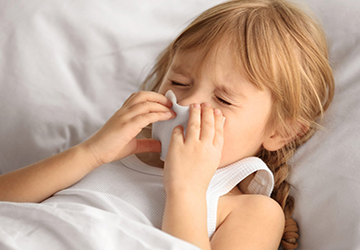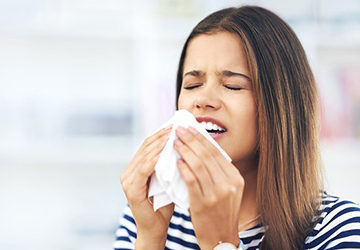Viruses are tiny pathogens that live in living cells. These cells are host cells. To multiply or replicate, a virus must have a host cell. There are many kinds of viruses, some more common than others. Viruses cause both the flu and the common cold. HIV and Ebola are viruses too. In typically healthy people, viral infections are usually mild.
However, people with weakened immune systems may experience severe symptoms from the virus. Almost any type of virus can cause sepsis. Sepsis is a form of blood poisoning that results from the body's response to infection. Viruses can be severe and should not be taken lightly. You should know and understand some common symptoms of many viral infections. It's worth noting that not all viruses in the body respond similarly.

1. Fever
A fever is a sign that your body is fighting an infection. Your fever can be mild or very high, depending on the type of virus you have. A fever may be low and gentle at first. If symptoms persist, the rage may become very high. Some people with the virus can have temperatures as high as 105 degrees Fahrenheit.
Bacterial infections are more likely to cause high fevers, but viruses can also cause fevers. If a fever is too high, it can lead to many other health problems. That's why using over-the-counter medications, cold baths, and other methods to manage fevers is essential. You should also seek immediate medical attention if your fever exceeds 102 degrees Fahrenheit, as this is dangerous.
2. Muscle pain
When the virus takes over the body, a person may experience muscle pain. Muscle aches all over the body are daily for people with illnesses like the flu. Sometimes, a person may feel that they cannot move because their muscles are so sore. The cause of muscle pain depends on your viral infection type.
People with viral pneumonia may experience muscle pain because their body muscles lack oxygen. This pain can be severe and last for days. When you suffer from muscle pain, the most important thing you can do is get as much rest as possible. This gives your body the time it needs to heal. Since there are no medicines to treat viral infections, rest and drinking plenty of fluids are the best treatment.
3. Cough
Another common symptom of a viral infection is coughing. The cough may be dry, harsh, or even cause wheezing. In other cases, a person with a viral infection may cough, coughing up phlegm and other fluid from the lungs. The cough can be very persistent, lasting days or even weeks, depending on the type of virus a person has.
If the cough persists for over seven days, it's best to see a doctor to determine the underlying cause. Over-the-counter cough medicines can often relieve this symptom short term. Often, these medications will give you enough relief to get you some sleep, which is what your body needs to heal. Your doctor may prescribe other medicines depending on what is triggering your cough.
4. Sore throat
It is not uncommon for a person to have a sore throat. Many types of bacteria and viruses can cause a sore throat. A cold or flu can cause a person to have a sore throat. However, if you have a chronic sore throat and feel like something is stuck in it, it could be a sign of some oral cancer.
A chronic sore throat is a sign that something is wrong, and you may want to discuss the cause of this symptom with your doctor. It could be something minor, like a virus, that goes away with treatment or something more serious. The doctor will be able to determine what is causing your sore throat and perform appropriate tests to determine precisely what is causing your pain.
5. Headache
Headaches can be very annoying. It makes it harder to do everything because you want to lie there until it disappears. While many different reasons can cause headaches, and it's normal to have an occasional headache, this symptom is a sign of something else going wrong with the body. A persistent headache may be a symptom of a viral infection, such as the flu.
When a person has the flu and experiences a headache, it is usually because they are not drinking enough fluids. This can lead to headaches when the body starts to become dehydrated. Drinking water and taking over-the-counter medications can help relieve headaches. However, if you suffer from headaches along with other symptoms included on this list, you most likely have a viral infection.

6. Chaos
If you experience some of the symptoms associated with a viral infection, such as shortness of breath, fever, chills, etc., may cause parts of your body to stop working correctly. When your body isn't getting enough oxygen, some of the less critical areas of your body shut down. This is to help you stay alive.
You will likely become delirious or unconscious if you have a high fever from a viral infection. It could be a sign of a severe viral infection if you're struggling with reality and feel like you're constantly passing out. It is essential to see a doctor as soon as possible to find out what is causing this feeling.
7. Joint pain
Joint pain is common. Many people suffer from joint pain from time to time. This pain becomes more common with age. However, if you notice joint pain and some other symptoms on this list, there's a good chance you have a virus.
Depending on your type of virus, your joint pain can be severe. Joint pain may come and go. Just like muscle pain, joint pain cannot be ignored. You most likely don't want to move, and that's not bad because if you have a viral infection or any other illness, you need to rest. After all, that's the best way for your body to sleep so it has time to heal.
8. Rash
Many different reasons can cause rashes. Some people are allergic to food or other objects, which can cause a rash on the skin. Others may develop a rash when they have a fever. The inflammation may even be caused by the sun. You probably have a virus if you're not feeling well and notice a rash anywhere.
The rash that develops can vary in size and can appear anywhere on the body where the inflammation is infected. It can be raised or flat, itchy, or not bothersome. The rash usually goes away independently, but it can sometimes become severe. If you develop a rash, your doctor can determine the best course of treatment.
9. Nausea and vomiting
Some viruses can affect the gastrointestinal system. In most cases, people with nausea and vomiting have what is known as stomach flu. This is caused by harmful bacteria or viruses entering the digestive system. Your body does what it can to remove the foreign material. You may lose your appetite for a few days. Some people vomit for a few hours and then feel better.
These errors usually go away quickly, but they can be severe when they appear. If you experience nausea and vomiting for a prolonged period, it is best to see your doctor for a check-uproot cause. Prolonged vomiting can indicate severe illness, so a doctor must be consulted.
10. Chills
It might seem odd that a person would experience chills after contracting a virus, especially since another common symptom is fever. However, fever and chills often occur together. A person may be burnt out one minute and ice cold the next. It is widespread for people with the flu to experience chills. Sometimes, a person may feel they can no longer warm up.
This usually happens when the fever subsides, and the body cools down quickly. Fever and chills are common; anyone with these symptoms likely has some viral infection. You most likely have a virus if you have a cold and experience several other symptoms on this list. Rest, drinking plenty of fluids, and overdosing on medication are usually the best treatments for this type of infection.

11. Fatigue
Fatigue can be a symptom of many different health problems. Fatigue is other than fatigue that is caused simply by not getting enough rest. People with fatigue feel like they cannot complete even the simplest tasks. People with viral infections may experience extreme fatigue. Infection can occur anywhere in the body, including the lungs. If the virus gets into the lungs, it can cause difficulty breathing.
This can make it difficult to get oxygen to body parts that need it. Every organ and every muscle needs oxygen to function optimally. Parts shut down when your body can't get enough oxygen because it's hard to breathe. It's essential to ensure you get enough rest during a viral infection, as this will help your body heal faster and allow you to return to regular work sooner.
12. Cramps
Some types of viral infections can be severe. When the virus invades the body, it can cause many problems—from lungs and other organs not working correctly to severe pain. People with severe viral infections can experience most of the symptoms on this list. In addition, a high fever can cause convulsions.
Cramps can be scary because you may not know what's happening inside your body. Viral infections can become serious very quickly. While rest and fluids are the best way to treat a viral infection, if you don't feel better after a few days, it's best to see your doctor to determine what's wrong. High fevers can become dangerous quickly, so early treatment is essential.
13. Diarrhea
Viral infections can irritate the entire digestive system. As mentioned earlier, vomiting and nausea are common symptoms of viral infections. In addition, people with viral infections may also experience diarrhea. Again, this is the body's way of eliminating invading foreign bodies. Viral infections can cause not only diarrhea but other digestive problems as well. These include heartburn and a feeling of general malaise.
Sometimes vomiting and diarrhea occur together, which can be very uncomfortable. If you have digestive issues from a viral infection, one of the most important things you can do is try to stay hydrated. As your body sheds fluids from your body, you need to replace them. It can be challenging, but staying hydrated is the best way to help your body recover and get enough rest.
14. Dehydration
Dehydration is not necessarily a symptom of a viral infection but a side effect. People with viral infections often have difficulty eating and drinking. This depends on the type of virus they are infected with. Viruses that cause digestive problems often cause a person to become dehydrated.
Eating or drinking anything is almost hard when feeling so bad. Even if it's essential to keep trying, even feel like you might not even sip water; it's because your symptoms are significantly worse when you are dehydrated. When you become dehydrated, you must go to the hospital to have fluids reinfused into your body. To avoid this, take small sips of water or other clear liquid for short periods.